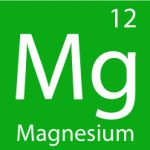Magnesium is responsible for giving you energy.
 In short, when you have low magnesium, you have lower levels of energy. When your magnesium intake is sufficient however, you have optimum energy levels.
In short, when you have low magnesium, you have lower levels of energy. When your magnesium intake is sufficient however, you have optimum energy levels.
Read on to discover more about the relationship between magnesium and energy, how to identify a magnesium deficiency, as well as some well known and very useful ways to increase your magnesium intake.
75% of Americans are at great risk of magnesium deficiency. The simple fact is that people are unable to get enough magnesium in their diets which may be full of refined sugars, processed foods, caffeine or alcohol and low in wholefoods.
Add to this a myriad of risk factors which are known to deplete your body’s natural magnesium stores much faster than usual:
-
Physical or emotional stress or trauma
-
Chronic absorption disorder such as Chrohn’s
-
Kidney or liver disease
-
 Diabetes
Diabetes -
Poor diet
-
Overuse of calcium supplements
-
Certain medications such as diuretics, ACE inhibitors, hormone therapy or antihypertensives
-
High intake of carbonated drinks, caffeine, refined sugars or alcohol
One of the classic tell tale symptoms for magnesium deficiency is fatigue or tiredness. It is here that we are able to identify and explain the relationship between magnesium and energy.
Please have a look at the article below to find out if you have any of the other symptoms of deficiency and what to do about it.
ATP is Energy
ATP or, adenosine tri-phosphate is the molecule responsible for providing our body with energy. And without magnesium, the processes required for ATP’s production, would not be able to occur leaving us with a big hole in our energy supply.
Magnesium and Energy
ATP is created by the breakdown of complex carbohydrates, fats and sugars into usable molecules such as glucose, fructose and fatty acids. Magnesium is the vital ingredient here as the co-factor for the enzymatic function which does the breaking down at this level.
What is ATP used for?
Our body is made up of cells, the building blocks of life. These cells are continually reproducing themselves at a high turnover rate as old cells die and need to be replaces. ATP is is involved in millions of processes at a cellular level. These include:
-
 Cell replication
Cell replication -
Metabolisation
-
Protein synthesis
-
Movement of molecules
-
DNA synthesis
All of these functions are what serve to give us the energy to fulfil our busy day-to-day lives. You can imagine that the more energy we use, the more ATP we need and the more ATP we need, the more magnesium is required in order to make it. So magnesium and energy are inextricably linked.
People who do a lot of exercise and who are continually using up their ATP and also their stored magnesium to constantly make more energy are usually magnesium deficient for this reason.
The body is able to continually process more and more ATP as it is always needed at a cellular level.
One of the really important jobs ATP does is to facilitate the transportation of molecules across the cell membrane in order to maintain a balance of our electrolytes.
The 4 electrolytes are magnesium, calcium, potassium and sodium and they are constantly moving between our intracellular and extracellular fluids depending on our current condition. Magnesium and energy are needed for maintaining the ideal equilibrium between the electrolytes as the ATP gives the molecules the power to move, and the magnesium is responsible for opening the channels in the cell membrane for the molecules to pass through.
Magnesium and energy are also related via sleep. 
Magnesium has a relaxation effect on the body. It is able to relax muscles and decrease anxiety helping the user to achieve a greater level of more deep REM sleep. Being well rested is important in reducing fatigue and tiredness for the coming day so not only do magnesium and energy effect each other at a cellular level, but magnesium is also important in the way it gives you better sleep and therefore more energy.
How do I know if I am lacking in magnesium?
The answer is a clear one. If your magnesium levels are less than ideal, you will be feeling tired and lacking energy for a start.
Some other telltale signs of magnesium deficiency are:
-
Sleep disturbance
-
High blood pressure
-
Fatigue
-
Muscle cramps
-
Muscle spasms or twitches
-
Nausea
-
Lack of appetite
-
Tremors
-
Anxiety
-
Heart palpitations
For more on magnesium deficiency symptoms click here.
How do I get more magnesium?
Food sources alone are usually inadequate to provide the required 320mg – 420mg per day of magnesium. Eliminating risk factors of refined sugars, alcohol and caffeine are a great place to start. Then have a look at this magnesium rich food list which can assist in giving you some ideas of the types of foods you should be consuming.
Some of the foods rich in magnesium and energy include:
-
 Whole grains
Whole grains -
Nuts and seeds
-
Legumes
-
Fish
-
Green leafy vegetables
Despite a nutritious diet, we may still need further magnesium supplementation in order to meet our daily needs.
There are a lot of different options for supplement use. As with any complementary therapy, please consult your doctor before commencing if you are under 18, are pregnant or breastfeeding, are on any medication, or suffer chronic disease.
The options for magnesium supplements include:
-
Magnesium chloride tablets and oils
-
Magnesium citrate powder
-
Magnesium sulphate bath salts
-
Liposomal magnesium gluconate
-
Magnesium glycinate
Here are some of the best supplements outlined in this article – >CLICK HERE<
For the top 3 most convenient and easy to use supplements – >CLICK HERE<
Comment Below
Do you have any experience with magnesium deficiency? If so then we would love to hear from you.
Comment below or drop us an email – info@whatismagnesiumdeficiency.com today!
DISCLAIMER The author of this article is not a doctor and the medical/dietary advice that is provided herein is not to replace users of the sites current medical situation or advice that may have been given by their GP or legal consultant. Whatismagnesiumdeficiency.com is here solely for support as an optional alternative. In no way does the information contained within www.whatismagnesiumdeficiency.com advise anyone to use this knowledge as a replacement for any medical condition.
Click here for more details on our disclaimer policy.


Permalink //
What an excellent article! I had no idea I had a magnesium deficiency as I always made the assumption I was tired because of my vigorous workout schedule. But now I understand I feel this way because I lack magnesium. I do appreciate your suggestions of food as I try to avoid supplements as I feel they are may be too manufactured for my body. Are any the products you suggested more natural than another?
Permalink //
Hi Amberlee I am so glad you enjoyed reading this article.
By far the most natural way to get magnesium, after food, would be to use a magnesium chloride supplement that has been sourced directly from an ancient oceanic source, mined naturally using solar evaporation and that is free of contaminents.
Have a look at this article on magnesium chloride for more information on this.
Kind regards and best of health to you,
Kristine G
Permalink //
I never knew that magnesium had such an impact on our bodies. I never have low energy so don’t think I am deficient but my wife gets tired, sleeps a lot and has high blood pressure. She has a good diet and eats lots of seed nuts and greens, she is also on medication for anxiety, do you know if that affects magnesium levels? Anyway it sounds like I should get her some magnesium supplements…Thanks for your article, you may have just made my wife’s life a lot better…
Permalink //
Hi Cambell, that is great news! I really hope that magnesium gives your wife the boost she surely needs. Come and check back on this site soon for an upcoming post on magnesium and anxiety too!
As with commencing on any supplement therapy, your wife should check with her doctor or pharmacist to ensure there will be no interactions with her current medications.
Best wishes to you and your wife.
If you any more questions you can email me on info@whatismagnesiumdeficiency.com
Regards, Kristine
Permalink //
I really am learning a lot about magnesium today for some reason!
I really find these posts informative as we just take a check on the iron and calcium levels on our body and disregard the important elements that is needed by our body.
Great read and keep posting
Thanks
Shrey
Permalink //
Thanks Shrey,
I hope you have learnt something here today.
Best in health, Kristine
Permalink //
Something I find interesting here is when you stated that magnesium helps with the enzymes to create ATP which breaks down carbohydrates, fats, and sugars. As you may well know, these are issues also relating to diabetes; the inability to effectively use proteins, carbohydrates, fats, and sugars. So it makes me wonder about the role magnesium plays in diabetes patients. This is very interesting indeed. I’ll have to do some personal research. Thank you.
Permalink //
Hello Katherine and thanks for your comments here. I know that having diabetes is a risk factor for magnesium deficiency as more magnesium is utilised in diabetes for metabolisation and enzyme function.
Best wishes, Kristine G
Permalink //
Something I find interesting here is when you stated that magnesium helps with the enzymes to create ATP which breaks down carbohydrates, fats, and sugars. As you may well know, these are issues also relating to diabetes; the inability to effectively use proteins, carbohydrates, fats, and sugars. So it makes me wonder about the role magnesium plays in diabetes patients. This is very interesting indeed. I’ll have to do some personal research. Thank you.
Permalink //
This is a fantastic post.
I personally take ZMA which I see you are selling.
ZMA is fantastic for a good nights sleep and gives you the most wild dreams lol
I am glad I found this sight as I have not really heard anything about a magnesium deficiency before
Thank you
Permalink //
Hi Coll and thanks for commenting. Did you see the recent post on ZMA?
Do you find it is effective in increasing your muscle mass if used as part of an intense training regime?
Thanks again, Kristine G
Permalink //
Overuse of calcium supplements is a big one. My mother was taking calcium supplements for her weak bones and she developed severe migraines that just wouldn’t go away. Eventually, I spoke to a man who runs a health food shop and he advised magnesium, so she tried that and the headaches went away.
But also, people drink a lot of milk, which is high in calcium but low in magnesium. When I was a kid at school years ago, they would even give milk to us at morning break time. But they didn’t realise that it was a bad source of calcium because of the lack of magnesium.
Permalink //
That’s so true. You need magnesium to balance out the calcium so if you are taking calcium supplements without magnesium supplements you are effectively using up your body’s stored magnesium to counteract the effects of the calcium, without replenishing it, leading to magnesium deficiency.
I hope your mother is much better now.
Regards,
Kristine G
Permalink //
Great article Kristine!!! As a chemistry faculty, i know much about magnesium element physical and chemistry properties and biological activities. But i have learned few characteristics of magnesium and its compounds from your articles which are very important for me. I can refer your website to students to know much about magnesium. Thank you
Permalink //
Thank you Brahma,
I hope my website can be of great benefit to your students too.
Thanks for commenting, Kristine G
Permalink //
This is really good information! I only used magnesium when training and participating in endurance cycling races. I understand that good magnesium stores when training for longer than 2 hours helps to prevent that build up of lactic acid in the muscles and prevents muscle cramps for longer periods. Thanks for this detailed explanation of magnesium benefits.
Permalink //
Hi George,
That’s right! It’s amazing how it works. That is why muscle cramps are a classic symptom of magnesium deficiency.
Thanks for reading, Kristine
Permalink //
Hi Kristine
It’s great how you have explained about the importance of ATP in the body. You’ve written it in an easy to understand way. Magnesium is one of those all-important minerals isn’t it? I have heard that it can play a role in dislodging heavy metals in the body too, due to it competing with the space taken up by unwelcome heavy metal deposits in the body. I think we all need to make sure we are taking enough. My sister has Chronic Fatigue Syndrome and I’m wondering now if a magnesium supplement may be of use to her. Have you heard much about this?
Thank you
Ange
Permalink //
Hi Ange,
I haven’t heard enough about magnesium and chronic fatigue yet to comment too much, but please stay tuned for an upcoming blog post on the subject.
It is very interesting as I have a personal connection with chronic fatigue.
Thanks for commenting here today, and I urge you to revisit this site in the near future to find your answers.
Best wishes, Kristine
Permalink //
Wow, this is a super great and informative article.
I’ve learnt alot about magnesium and it’s importance in our bodies.
One question, are magnesium tablets/supplements expensive, and are they easy to locate and buy in local supermarkets?
You explained the deficiency very well and I’m sure this will help a lot of people including me
Permalink //
Hi Claire, thanks for stopping by. Have a close look at the constitution of the magnesium supplements found in your local supplements and be careful what you buy. Often the cheaper supplements are full of cheaper sources of magnesium such as oxide and stearate rather than more pure sources such as magnesium chloride, magnesium citrate or magnesium gluconate
Click on the links about for more info about the best forms of magnesium which have greater absorption and bioavailability and also information on where to purchase these.
Otherwise, check out your local pharmacy or health food store for some other good options.
Best wishes, Kristine G
Permalink //
I’m a believer in the connection between magnesium and energy, and how it helps improve mood too.
I enjoy working hard and tend to push myself until I’m exhausted. If I don’t rest enough, my moods also turn dark and depressed.
About a year ago, my girlfriend came home with a bottle of liquid magnesium supplement. She had been to a week long dietary workshop and learned about magnesium there.
I felt the difference immediately with more energy and a better mood. If anyone is struggling with low energy or moodiness, try a magnesium supplement. I prefer the liquid because it tends to act faster to lift my mood and energy level.
Permalink //
I couldn’t agree more Gary!
Thanks for your comments.
Best of health,
Kristine G